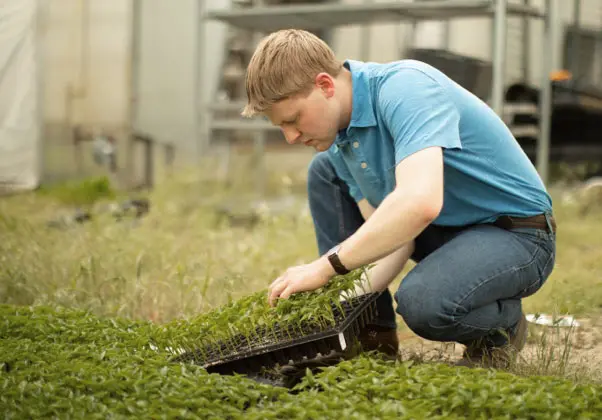Agribusiness Career Pathway
Budding Farmer?
Is your child looking to take the family farm to the next level? A city kid looking for a rural lifestyle and the chance to grow their own food? An environmentalist who’s always prodding your family to reduce, reuse, and recycle? If the answer to any of these questions is yes, they may be right for a career in agribusiness!
Gain real-world Agribusiness experience with project-based learning.
For those who pursue the Agribusiness Pathway, Career Prep* offers a rigorous, project-based learning curriculum designed to hone their problem-solving, communication, critical thinking, and team collaboration skills. Students tackle real-world problems, such as writing a blog post for a university agriculture extension office on a crop of their choosing, creating a marketing plan for a new agricultural product, and working with a team to spearhead an agricultural project in their own community.
They’ll be guided by experienced agribusiness professionals and receive training in agriscience, agribusiness, and entrepreneurship.
The Career Prep curriculum is designed to give students the skills necessary to embark on a career as a farmer, rancher, or agriculture and food science technician right after high school graduation—without the hassle or expense of additional training or degrees.
Our Agribusiness Pathway Curriculum in Detail
All of our students take the core courses required for high school graduation in their state. The chart below shows the additional classes your student will take as an Agribusiness student. You can see the rest of the curriculum by viewing the full course list.
EXPLORATION COURSES
These courses provide an opportunity for students to gain insight into potential careers.
CAREER FOUNDATION COURSES
These courses are building blocks that prepare students for more specialized pathway courses.
CAREER PREPARATION COURSES
These courses prepare students for industry-recognized certification exams.
OPTIONAL CAREER LEARNING COURSES
While not required, these courses provide an opportunity for students to gain knowledge and skills that are useful in their chosen careers.
Agriculture Explorations
OR
Agriscience 1
Principles of Agriculture, Food & Natural Resources
General Agriscience 2
Agribusiness
Intro to Forestry and Natural Resources
Wildlife, Fisheries, and Ecology Management 1†
Wildlife, Fisheries, and Ecology Management 2†
Green Design and Technology
Marketing 1
Marketing 2
Introduction to Business Information Management
Business Information Management: Data Essentials
Summit Personal Finance
Note: Pathway courses are subject to change.
†New in fall 2022
Get ahead of the competition.
We encourage students to jumpstart the job search by helping them create a professional résumé, cover letter, and profile on Tallo, the leading professional networking platform for Gen Z. Plus, they connect virtually to working business professionals and entrepreneurs through Nepris.**
Find a school near you that offers agribusiness.
Career Prep programs with the Agribusiness pathway are available at tuition-free K12-powered, public online schools in the following states:
Don’t see your state? Check out the tuition-based option here in the Agribusiness Pathway. There are also tuition-free options in related fields like the Food Processing & Production Pathway!
Choose a career. Prepare for the future.
Agricultural and food scientists conduct research and experiments to improve the productivity and sustainability of field crops and farm animals; create new food products; and develop new and better ways to grow, process, package, and deliver them. Most agriculture and food scientists focus on a particular subspecialty, such as improving the productivity and health of domestic farm animals (animal scientists); the productivity, management, and conservation of high-quality soil (soil scientists); increasing crop yields and controlling pests and weeds (plant scientists); or food processing, preserving, packaging and distribution techniques (food scientists and technologists).
2021 Median Salary
$74,160
Expected Job Growth Rate for 2020–2030
Average
Typical Entry-Level Education
Bachelor’s degree
This data reflects the information available from the Bureau of Labor Statistics, U.S. Department of Labor, Occupational Outlook Handbook on July 1, 2022. To learn more about this occupation, visit bls.gov/ooh/life-physical-and-social-science/agricultural-and-food-scientists.htm.
Agricultural and food science technicians assist agricultural and food scientists by performing duties such as measuring and analyzing the quality of food and agricultural products. Agricultural science technicians focus on improving the productivity of farm animals and crops. They collect, prepare, analyze, and store crop or animal samples to determine the presence of diseases or other quality or safety issues; they may measure ingredients used in animal feed and prepare and operate laboratory equipment. Food science technicians focus on improving food production and processing, maximizing efficiency, and ensuring quality and safety. They collect and prepare samples of food products, additives, and packaging to ensure they meet quality and safety standards; they may also measure the chemical properties of food to determine ingredients and formulas.
2021 Median Salary
$44,700
Expected Job Growth Rate for 2020–2030
Average
Typical Entry-Level Education
Associate’s degree
This data reflects the information available from the Bureau of Labor Statistics, U.S. Department of Labor, Occupational Outlook Handbook on July 1, 2022. To learn more about this occupation, visit bls.gov/ooh/life-physical-and-social-science/agricultural-and-food-science-technicians.htm.
Agricultural engineers apply engineering solutions to the challenges facing farmers, ranchers, aquaculturists (fish farmers), and others in the food supply chain. They work on a wide variety of projects. Some agricultural engineers work to develop climate control systems that increase the comfort and productivity of livestock whereas others work to increase the storage capacity and efficiency of refrigeration. Many agricultural engineers attempt to develop better solutions for animal waste disposal. Those with computer programming skills work to integrate artificial intelligence and geospatial systems into agriculture. For example, they may work to improve efficiency in fertilizer application or to automate harvesting systems.
2021 Median Salary
$82,640
Expected Job Growth Rate for 2020–2030
Slower than average
Typical Entry-Level Education
Bachelor’s degree
This data reflects the information available from the Bureau of Labor Statistics, U.S. Department of Labor, Occupational Outlook Handbook on July 1, 2022. To learn more about this occupation, visit bls.gov/ooh/architecture-and-engineering/agricultural-engineers.htm.
Farmers grow crops (e.g., corn, wheat, soybeans) to serve as food for humans or animals or, occasionally, for other purposes (such as making ethanol, an additive to gasoline). Ranchers raise cattle or other animals for meat. Many farmers employ technology through precision agriculture to guide irrigation and other measures to increase crop yields, and ranchers use technology via data-driven veterinary care, careful breeding for genetic diversity, and other herd management techniques to improve yields. Farmers and ranchers are also skilled financial experts: overseeing financial operations often surpassing $1 million; controlling costs for seed, animal feed, irrigation, high-tech equipment, and other agriculture inputs; and constantly monitoring financial markets to get the best possible price for their product.
2021 Median Salary
$73,060
Expected Job Growth Rate for 2020–2030
Little change
Typical Entry-Level Education
High school diploma or equivalent
This data reflects the information available from the Bureau of Labor Statistics, U.S. Department of Labor, Occupational Outlook Handbook on July 1, 2022. To learn more about this occupation, visit bls.gov/ooh/management/farmers-ranchers-and-other-agricultural-managers.htm
FAQs
Today’s farmers and ranchers are the backbone of rural communities—and the leading entrepreneurs in those communities. They need to be: tech-savvy. Farmers and ranchers need to stay informed about the latest developments in precision agriculture, farm machinery, veterinary care, herbicides, and pesticides, and leverage this technology to increase crop yields and/or the health and management of herds. Product developers and marketers. Farmers and ranchers need to be constantly monitoring market trends and climatic conditions and adjusting their product mix (or even introducing new products) to maximize profits and diversify revenue sources. They might switch to a new variety of apples or a new breed of chickens, or grow a specialty crop to supply a local restaurant. Or they might open their farm to the public for farm stays, “U-pick” weekends, or visits to a petting zoo. They might even operate an agricultural cooperative, with members of the community buying a “share” of their produce. All of this requires knowledge about market positioning, sales, and promotions. Financially savvy. Farmers and ranchers typically borrow money to purchase seed, equipment, and animals—and many farms are multi-million-dollar businesses! So, farmers and ranchers must be savvy about borrowing the right amount of money at the lowest possible financing charge, and they must manage cash flows to be able to make required payments. They must also make wise investing and pricing decisions. So, if your student is interested in pursuing a career as a farmer or a rancher, they need to understand both the science and the business of agriculture. They can take classes in agricultural science, agribusiness, and entrepreneurship. They can also participate in clubs such as 4-H and FFA (formerly known as Future Farmers of America). The Agribusiness pathway incorporates classes in agriscience, agribusiness, and entrepreneurship.
While aspiring farmers or ranchers may find it useful to get a college degree in agricultural science or a related field, it is not absolutely necessary. The most important preparation is to work on a farm and to try to get exposure to the business side of running a farm. Taking agricultural science classes at a vo-tech high school or online is also important, as is participating in organizations like 4-H and FFA. The Agribusiness pathway incorporates classes in agriscience, agribusiness, and entrepreneurship.
*Career Prep is a program for grades 9–12. Some schools offer career exploration in middle school.
**Opportunities vary by school; please visit your school page or check with your school counselor.
Note: Many Microsoft®️ Office certificates can be earned after completing one course. Other certificates require more classes to be better prepared, and students who participate in the program for at least two years will have further preparation for certification testing.











